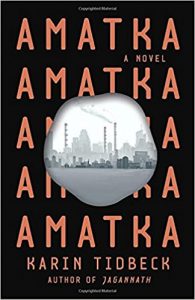 translated from the Swedish by the author
translated from the Swedish by the author
Vintage Books
June 27, 2017
224 pages
*some spoilers*
A lot has been written about Amatka– a strange, compelling, and truly fascinating novel- so I won’t rehash the plot and characters here. Instead, I’ll write about what I found most intriguing and why. Deal? Deal.
There’s something about words themselves having tangible power over the material world, or even moving around of their own volition, that piques my interest. While reading Amatka, a story in which words literally have the power to shape matter, I inevitably thought about other texts like “Techt” by Sofia Rhei, “City of Silence” by Ma Boyong, and The Rabbit Back Literature Society by
Even the characters’ names are extremely literal- for example, “Brillars’ Vanja Essre Two” includes Vanja’s father’s name, her given name, her colony’s name, and the number of the children’s house where she grew up. In the story, characters literally have to write the word “door” on doors or “pencil” on pencils so that those objects retain their shapes. If, however, someone pronounces a word wrong or doesn’t make sure that the markings are clear, the object melts into a kind of whitish “goop.” Vanja, who herself has always felt like an outsider, has often been drawn to why this occurs and what happens when she defies the rules- not in a completely conscious way, though. Her growing insistence that the world can be other than it is pushes her to ultimately embrace dematerialization and then use it to her advantage.
Perhaps the most tantalizing part of Amatka is the reference to a different world, from which the colonists escaped. Though this “new world” originally contained five colonies, just four remain, since the fifth apparently spoke/thought too much about the sun (from the previous world). That celestial body supposedly broke through the permanent gray skies and destroyed the entire colony. Is that world from which the characters’ ancestors escaped our world? And how did people find the way into this other world? Why does this new environment teeter on the brink of destruction, with only language to keep objects and people solid?
And, of course, what do the poet Anna and her fellow refugees from Amatka ultimately become when they form their own colony? Do they enter yet another world/dimension/universe?
I have to say that I was pretty happy with the inconclusive ending (though I wanted to know much more about the strange machine and those pipes!), since, in my experience, endings are often disappointing in books that explore tantalizing mysteries.
And yes, I will read Jagannath as soon as I can find it in the mile-high TBR pile I’ve built for myself.
